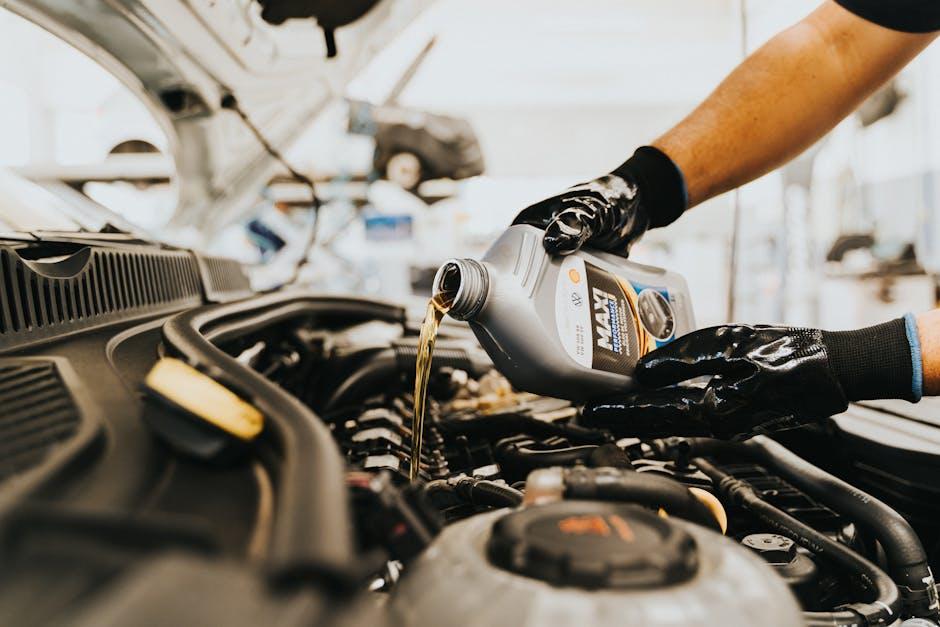Imagine your car as a living, breathing machine—one that relies on a steady flow of lifeblood to keep its heart beating smoothly. That lifeblood is engine oil, silently working behind the scenes to lubricate, cool, and protect the intricate metal components within. But what happens when this vital ritual of changing the oil is neglected or skipped altogether? In this article, we’ll explore the consequences of ignoring oil changes, unveiling the hidden costs and mechanical risks that can turn a simple oversight into a costly automotive nightmare. Whether you’re a seasoned driver or a curious car owner, understanding the role of oil changes might just save your vehicle—and your wallet—in the long run.
Table of Contents
- Understanding the Role of Oil in Engine Health
- Consequences of Neglecting Regular Oil Changes
- How Dirty Oil Impacts Engine Performance and Fuel Efficiency
- Signs Your Vehicle Is Suffering from Overdue Oil Maintenance
- Long-Term Damage and Repair Costs to Watch Out For
- Expert Tips to Stay on Track with Your Oil Change Schedule
- Q&A
- The Conclusion
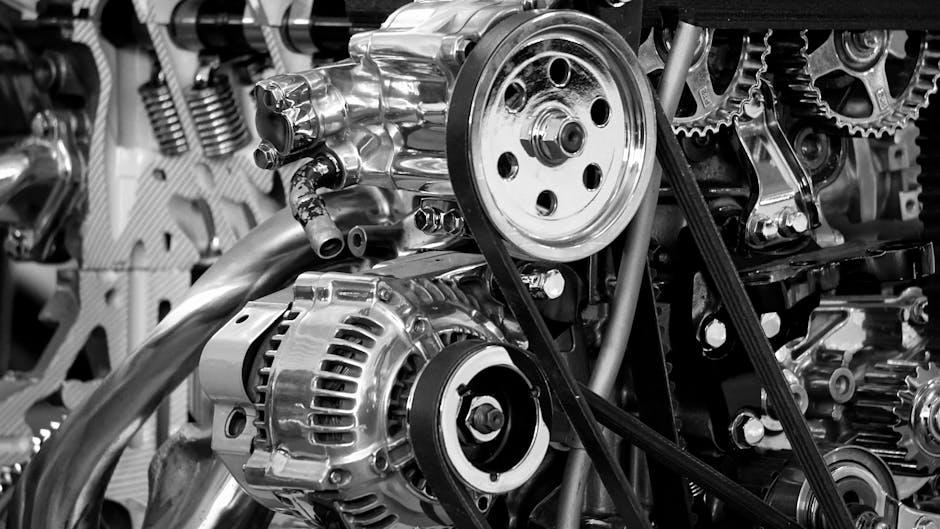
Understanding the Role of Oil in Engine Health
Engine oil serves as the lifeblood of your vehicle’s engine, performing several critical functions that keep it running smoothly. It acts primarily as a lubricant, reducing friction between moving parts to prevent wear and tear. Beyond lubrication, oil also helps in dissipating heat, ensuring components don’t overheat, and in keeping the engine clean by carrying away debris and contaminants. Without proper oil maintenance, these functions are compromised, leading to accelerated engine damage and reduced performance.
When oil is neglected or becomes too degraded, its effectiveness drops dramatically. This can result in:
- Increased engine friction: Causing harsh noises and premature part wear.
- Overheating: Due to poor heat dissipation and thicker oil viscosity.
- Build-up of sludge: Impeding oil flow and clogging vital channels.
- Corrosion and rust: From moisture and acids accumulating inside the engine.
| Function of Fresh Oil | Consequence of Skipping Oil Change |
|---|---|
| Lubrication | Increased friction and wear |
| Heat Dissipation | Overheating and engine damage |
| Contaminant Removal | Sludge build-up and blockages |
| Corrosion Prevention | Internal engine rust and corrosion |
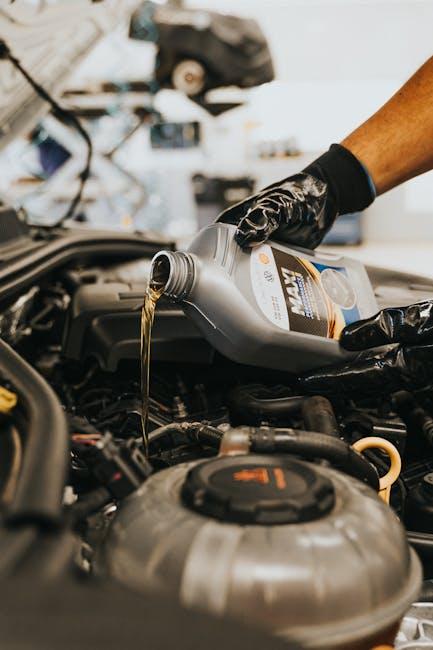
Consequences of Neglecting Regular Oil Changes
Failing to change your engine oil regularly can lead to a cascade of mechanical issues that diminish vehicle performance and longevity. Over time, oil degrades and loses its ability to lubricate engine parts effectively, causing increased friction and heat. This can result in accelerated wear and tear, which increases the risk of costly repairs like piston damage or even complete engine failure. Additionally, old oil accumulates dirt, debris, and metal particles, which circulate through your engine, acting like an abrasive and further damaging the internal components.
Ignoring oil changes also impacts your vehicle’s efficiency and emissions. Sludgy oil hampers the engine’s ability to run smoothly, reducing fuel economy and increasing harmful exhaust emissions. Below is a quick overview of common problems caused by neglecting oil changes:
- Reduced engine efficiency leading to poor fuel mileage
- Overheating due to insufficient lubrication and cooling
- Corrosion and sludge buildup inside the engine
- Increased wear on vital engine parts like bearings and camshafts
- Voided warranties due to neglecting manufacturer-recommended maintenance schedules

How Dirty Oil Impacts Engine Performance and Fuel Efficiency
Over time, engine oil collects dirt, metal particles, and combustion residues, transforming from a clean lubricant into a gritty sludge. This buildup hinders the oil’s ability to properly lubricate engine components, causing increased friction and wear. As the oil thickens and becomes contaminated, it struggles to flow through the engine’s narrow passageways. This reduced circulation means vital parts like pistons and bearings don’t get the smooth glide they need, which can lead to overheating and premature engine wear.
The consequences go beyond just mechanical wear:
- Decreased fuel efficiency as the engine works harder to overcome internal friction
- Reduced engine power and responsiveness
- Higher emissions due to incomplete combustion and inefficient lubrication
- Potential for costly repairs if neglected over a prolonged period
| Oil Condition | Engine Performance | Fuel Efficiency |
|---|---|---|
| Clean | Optimal | High |
| Moderately Dirty | Reduced | Moderate |
| Severely Contaminated | Poor | Low |
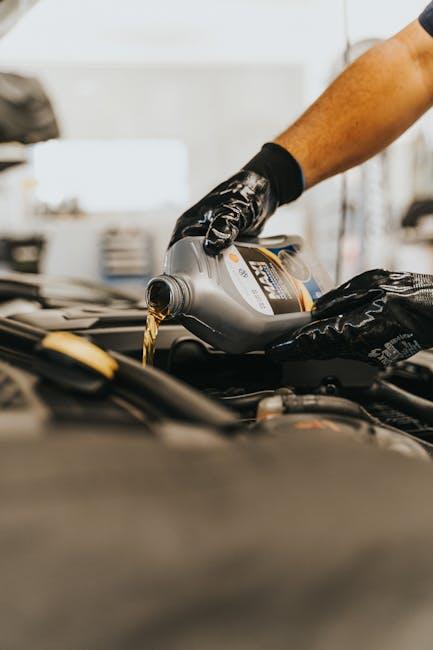
Signs Your Vehicle Is Suffering from Overdue Oil Maintenance
Ignoring timely oil maintenance can manifest in several noticeable ways that, if caught early, can save you from costly repairs. One of the most common symptoms is unusual engine noises, such as knocking or ticking sounds, which occur when oil loses its lubricating properties and parts start grinding against each other. Additionally, you may observe a significant drop in engine performance or fuel efficiency. This happens because old, dirty oil creates friction, causing the engine to work harder than necessary.
- Dark, dirty oil on the dipstick: Fresh oil is amber and transparent, while compromised oil becomes dark and gritty.
- Oil warning light or check engine light: Alerts your attention to oil-related issues immediately.
- Excessive exhaust smoke: Cloudy or blue smoke can indicate burning oil.
- Engine overheating: Insufficient oil causes higher operating temperatures.
| Symptom | Cause | Potential Damage |
|---|---|---|
| Engine knocking | Low lubrication | Worn pistons and bearings |
| Reduced fuel economy | Increased friction | Higher fuel costs |
| Oil warning light | Low oil pressure | Engine seizure risk |

Long-Term Damage and Repair Costs to Watch Out For
Neglecting regular oil changes can set off a chain reaction of mechanical failures that often go unnoticed until it’s too late. Over time, dirty oil ceases to effectively lubricate engine parts, resulting in increased friction and wear. This gradual degradation can lead to engine overheating, decreased fuel efficiency, and ultimately, complete engine seizure—a costly repair most drivers dread. The accumulation of sludge and debris can clog vital passages, starving crucial components of lubrication and accelerating deterioration. The financial impact often escalates rapidly, turning what might have been a simple oil change fee into a multi-thousand-dollar repair bill.
Here are a few potential long-term consequences you’ll want to avoid:
- Engine Rebuilds or Replacement: Intensive repairs like these can cost between $2,500 to $4,500.
- Turbocharger Damage: If your car has a turbo, dirty oil drastically shortens its lifespan.
- Reduced Resale Value: Extensive engine issues can significantly drop your car’s market price.
| Damage Type | Estimated Repair Cost | Likelihood Without Oil Change |
|---|---|---|
| Engine Sludge Removal | $300 – $700 | High |
| Major Engine Repair | $1,500 – $3,000 | Medium |
| Full Engine Replacement | $3,000 – $7,000+ | Low to Medium |
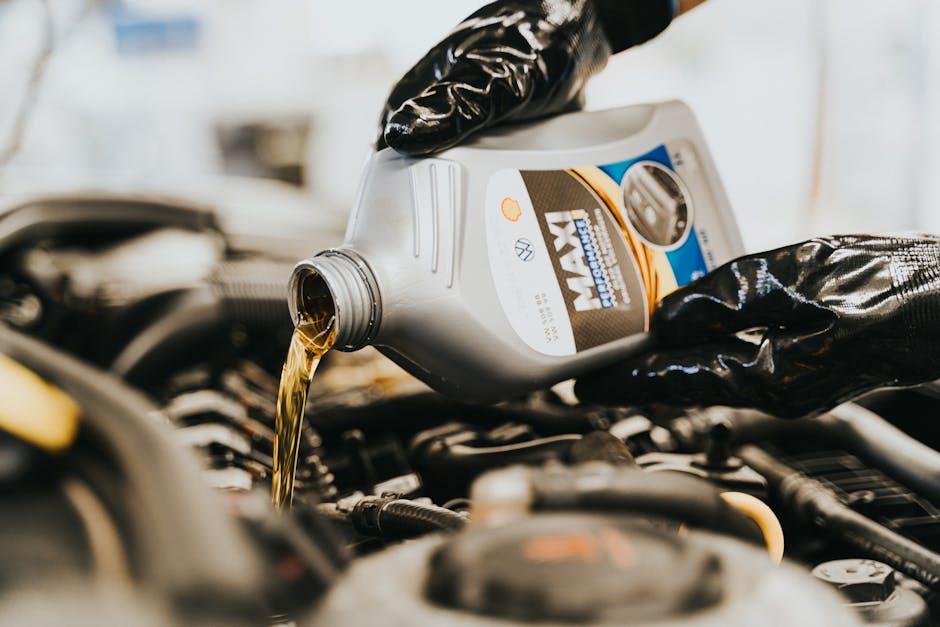
Expert Tips to Stay on Track with Your Oil Change Schedule
Maintaining a consistent oil change schedule can seem tedious, but adopting a few practical strategies ensures your engine stays happy and healthy. Set reminders on your phone or calendar to alert you when it’s time for an oil change—this simple habit helps avoid unintentional skips. Additionally, keeping a dedicated maintenance log in your glove compartment or using digital apps designed for vehicle upkeep can track mileage and service dates effortlessly. These tools provide a clear snapshot of your oil change history and upcoming needs, empowering you to plan visits proactively rather than reactively.
Another smart tip is aligning your oil changes with other regular car services like tire rotations or brake inspections. This integrated approach not only saves time but also keeps your maintenance routine streamlined. To better visualize the benefits of staying on schedule compared to delaying oil changes, take a look at this quick reference table:
| Interval | Engine Performance | Risk Level | Cost Impact |
|---|---|---|---|
| Every 3,000–5,000 miles | Optimal | Low | Low |
| Every 6,000–7,500 miles | Good | Moderate | Moderate |
| Beyond 7,500 miles | Declining | High | High (Potential repairs) |
Q&A
Q: What actually happens when you skip an oil change?
A: Skipping an oil change means your engine oil gets dirty and loses its ability to lubricate effectively. Over time, this can cause friction, overheating, and increased wear on engine parts, potentially leading to costly damage.
Q: Can skipping oil changes damage my engine immediately?
A: Not necessarily overnight, but the effects accumulate. Old oil thickens and sludge can form, which clogs up vital engine components. This slow buildup reduces performance and, eventually, can cause serious failures.
Q: How does dirty oil affect fuel efficiency?
A: Dirty oil forces your engine to work harder because of increased friction and less effective heat dissipation. As a result, your fuel consumption rises, meaning more money spent at the pump over time.
Q: Is it ever okay to delay an oil change by a few thousand miles?
A: Occasionally delaying by a small margin might not cause immediate harm, especially if you drive lightly. However, consistently pushing oil changes beyond the manufacturer’s recommendations increases the risk of engine wear and breakdown.
Q: What are the long-term consequences of ignoring oil changes?
A: Long-term neglect can lead to engine sludge buildup, reduced horsepower, poor fuel economy, and even engine seizure. Repairing or replacing an engine is far more expensive than routine oil changes.
Q: Can synthetic oil reduce the need for frequent oil changes?
A: Synthetic oils typically last longer and resist breakdown better than conventional oils, allowing for extended intervals between changes. However, they still require timely replacement as specified by your vehicle’s guidelines.
Q: How can I tell if my oil needs changing without a reminder service?
A: Check the oil level and color regularly. Fresh oil is amber and translucent, while old oil is dark and gritty. Also, pay attention to engine noises, poor performance, or warning lights that might indicate oil issues.
Q: What’s the best way to avoid the risks of skipping oil changes?
A: Stick to your vehicle manufacturer’s maintenance schedule, use the recommended oil type, and consult your mechanic if you notice any performance changes. Regular oil changes are a small investment that protects your engine’s lifespan.
The Conclusion
In the grand journey of your vehicle’s life, oil changes might seem like small pit stops, easy to overlook. But as we’ve explored, skipping them can turn these brief pauses into prolonged detours filled with costly repairs and performance pitfalls. Just as a marathon runner trusts their training and gear, your engine relies on fresh oil to keep moving smoothly. So, while it’s tempting to delay or skip this routine care, remember: a little attention today can mean a longer, healthier ride tomorrow. After all, in the story of your car, consistent oil changes write the chapters of longevity and reliability.

